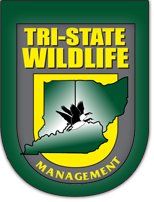Tri-State Wildlife Management – Protecting You, Your Property, and Your Investment
Pigeon Damage and Damage Identification
Pigeons can be found in large flocks around sizable buildings, farms, cliffs and bridges. Pigeons are easily identifiable birds due to their messy habits. They leave their droppings everywhere they go, especially their roost sites. Pigeon droppings contain uric acid that makes it extremely corrosive. The droppings are the direct cause of millions of dollars’ worth of damage to buildings and other property, which makes pigeon control very important. Also, debris from roosting flocks can build up, backing up gutters and drains thus causing damage to roofs and other structures. Extensive damage to air conditioning units and other rooftop machinery is commonplace. A tragic example of the corrosive nature of pigeon droppings is a 2007 Minnesota bridge accident, which was found to be a direct result of droppings drastically corroding the metal supports until they were sufficiently weakened.
There are also other economic costs that can be associated from pigeons taking up residence such as slip and fall liability and projection of an unclean, dirty company image. Besides physical damage, the bacteria, fungal agents and ectoparasites found in pigeon droppings and nesting materials sometimes represent a health risk.
Pigeon Damage Control Methods
Once a building becomes home to pigeons, they are there for life. Trapping and relocation may seem like a good idea, but when you attempt to relocate them, they will fly back to their roost site. Being a direct descendant of the homing pigeon, they have an excellent sense of direction and can find their way to their original location from many miles away. This trait gives the pigeon a very determined personality when it comes to roosting at a particular site.
Keeping pigeons off buildings often depends on choosing the correct plan for the situation. The success of a pigeon control program depends on how determined the birds are to occupy the former territory, and how determined we are to keep them out.
General Biology of Pigeons
Pigeons are not a native species to America, but are found in large numbers across the country. They live for 3-4 years in the wild and can breed year round. They are monogamous but both sexes may occasionally mate with other pigeons. A nesting pair will typically have 3-4 broods a year. Most of their nests contain 1-3 eggs, and they take approximately 18 days to hatch.
Pigeons are not migratory, and prefer to live and breed near their birth site. The daily routine of a pigeon is to feed during the morning, rest during the afternoon, and roost at night. Both parents feed the young, but the male does all the guarding of the nest and young.
General Information
The feral pigeon is the number one urban pest bird. Large numbers exist in every city across the country. Not a native bird, feral pigeons are descendants of domestic homing pigeons brought over from Europe and released here in the 17th century. They were domesticated from the wild rock doves from the sea cliffs of Europe by the Romans over two thousand years ago. Several traits have allowed them to dominate the urban landscape. Because of their history, pigeons are not afraid of people; they roost and nest readily in man-made structures and they have a diverse diet. The standard pigeon has a short neck with a small head. Their short legs with the level front and hind toes allow them to perch on branches as well as walk on flat surfaces.
Health Hazards with Pigeons
There are many health risks associated with birds and their droppings. You do not want to turn a blind eye towards birds and underestimate the risks associated with them. The bacteria, fungi, and ectoparasites that they and their droppings harbor are numerous. Some of the diseases associated with birds are Histoplasmosis, Cryptococcus, Listeriosis, Newcastle Disease, and Salmonella. Birds also carry many ectoparasites such as ticks and mites that can infect their human hosts with such diseases as Encephalitis, Avian Pox and Meningitis. TSWM can provide you with a safe and effective abatement of disease carrying contaminants. Bird droppings and nests can be safely removed and the site disinfected to reduce the health risks to you and others that may come in contact with the contaminants.
To have your pigeon problem taken care of sooner rather than later, call us today! Put our experience and expertise to work for you!
Tri-State Wildlife Management is fully insured, and we stand behind all of our work.










